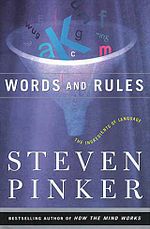Words and Rules: The Ingredients of Language is a 1999 popular linguistics book by Steven Pinker on the subject of regular and irregular verbs. In Pinker's words, the book "tries to illuminate the nature of language and mind by choosing a single phenomenon and examining it from every angle imaginable." His analysis reflects his view that language and many other aspects of human nature are innate evolutionary-psychological adaptations. Most of the book examines studies of the form and frequency of grammatical errors in English (and to a lesser extent in German) as well as the speech of brain-damaged persons with selective aphasia. The title, Words and Rules, refers to a model Pinker believes best represents how words are represented in the mind. He writes that words are either stored directly with their associated meanings, in a "mental dictionary", or constructed using morphological rules. Leak and rose, for example, would be stored as mental dictionary entries, but the words leaking and roses do not need to be memorized separately, as they can be easily constructed by adding the appropriate suffixes. By analyzing the English errors children make (such as overgeneralizing morphological rules to create words like mouses and bringed), he concludes that irregular verbs are not remembered in terms of the rules that produce them (such as the rule that produces sleep/slept, weep/wept, keep/kept, etc.), and instead have their past tenses memorized directly. The words and rules model contradicts previous ideas (both connectionist and orthodox Chomskyan) hypothesizing that irregular past tenses are the result of rules applied based on phonological similarities. Pinker accepts a weak form of the connectionism model to explain the origin of the small number of recent irregular verbs that obtained their past tenses due to surface similarity to other already-irregular verbs. However, Pinker shows research showing these sorts of generalization to be exceedingly rare in comparison to the overapplication of regular past tense rules ("add '-ed'") to words with irregular past tenses. His research also examines past-tense formation among German speakers, further supporting his conclusion. "Words and Rules" is also the title of an essay by Steven Pinker outlining many of the topics discussed in the book

Steven Arthur Pinker (born September 18, 1954) is a Canadian-born experimental psychologist, cognitive scientist, linguist and popular science author. He is a Harvard College Professor and the Johnstone Family Professor in the Department of Psychology at Harvard University,[2] and is known for his advocacy of evolutionary psychology and the computational theory of mind. Pinker's academic specializations are visual cognition and psycholinguistics. His experimental subjects include mental imagery, shape recognition, visual attention, children's language development, regular and irregular phenomena in language, the neural bases of words and grammar, and the psychology of innuendo and euphemism. He published two technical books which proposed a general theory of language acquisition and applied it to children's learning of verbs. In his popular books, he has argued that language is an "instinct" or biological adaptation shaped by natural selection. He is the author of six books for a general audience: The Language Instinct (1994), How the Mind Works (1997), Words and Rules (2000), The Blank Slate (2002), The Stuff of Thought (2007), and The Better Angels of Our Nature (2011).
